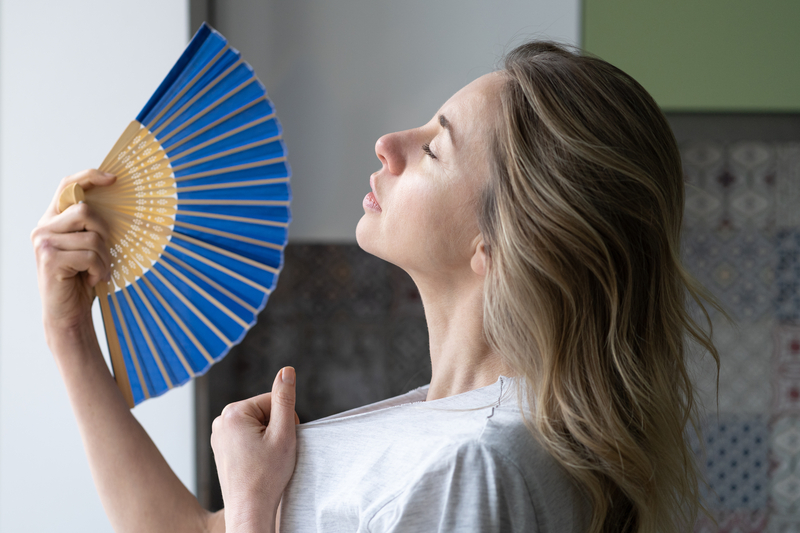Research journals and nutritionists continue to clarify the relationship between declining levels of estrogen in menopause and calcium deficiency in women.
Adelle Davis, the first nutritionist to base her recommendations on science-based studies says, “During the menopause, the lack of ovarian hormones (estrogen and progesterone) can cause severe calcium deficiency symptoms to occur, such as irritability, hot flashes, night sweats, leg cramps and insomnia.”
Helen Bishop MacDonald agrees with this in her article from the journal *Nursing British Columbia*. She says that, “Aging, combined with the estrogen reduction that occurs at menopause, results in an estimated 20 to 25% deterioration in calcium absorption in women from 40 to 60 years of age.”
The National Institutes of Health fact sheet on calcium discusses other factors that can affect calcium absorption. Vitamin D helps improve calcium absorption. Your body can obtain vitamin D from foods like salmon, sardines, eggs and cheese. It can also make vitamin D when your skin is exposed to sunlight.
Increasing dietary potassium intake, for example by eating 7 to 8 half-cup servings of fruits and vegetables per day, may help decrease calcium loss — particularly in postmenopausal women. Alcohol can affect calcium status by reducing the intestinal absorption of calcium.
We think of calcium as food for our bones, but it’s also a natural sedative that releases the sleep-inducing amino acid tryptophan. Calcium is directly related to our cycles of sleep. In one study, published in the European Neurology Journal, researchers found that calcium levels in the body are higher during some of the deepest levels of sleep, such as the rapid eye movement (REM) phase.
The study concluded that disturbances in sleep, especially the absence of deep REM sleep or disturbed REM sleep, are related to a calcium deficiency. Restoration to the normal course of sleep was achieved following the normalization of the blood calcium level.
Regarding the relationship between calcium and insomnia, Adelle Davis says, “A calcium deficiency often shows itself by sleeplessness and insomnia, another form of an inability to relax. The harm done by sleeping tablets, to say nothing of the thousands of dollars spent on them, could largely be avoided if the calcium intake were adequate.”
Jobee Knight, a nutritional researcher and founder of Nutrition Breakthroughs in Clearwater, Florida, is someone who fought her own battle against menopausal insomnia. After testing several formulas containing calcium, one stood out from the rest. The product, which became Sleep Minerals II, contains calcium, magnesium, vitamin D and zinc. The ingredients are formulated with carrier oils such as rice bran oil, which has been shown to increase mineral absorption.
Valerie H. of Santa Clarita, California says: “I had such severe menopause insomnia that it took me hours to fall asleep even though I was extremely tired. My legs also had crawling and tingling feelings at night. I got the Sleep Minerals and after about a week, it started to work really well. I fall asleep now within 20 minutes and no more restless legs.”
Adelle Davis recommends calcium is best taken by balancing it with about half as much magnesium, and complementing it with Vitamin D. Davis says, “Because calcium is less well absorbed and the urinary losses are greater when the output of estrogen decreases, such calcium-deficiency symptoms as nervousness, irritability, sleeplessness, headaches, and depression are common (at menopause). These problems can be easily overcome if the intakes of calcium, magnesium, and vitamin D are all generously increased and are well absorbed.”
In summary, the American Journal of Health-System Pharmacy writes: “Due to a decrease in estrogen production after menopause, women’s bodies are less able to retain calcium from dietary sources. Calcium supplementation has been used for decades to prevent this calcium depletion, maintain bone mass, and prevent and treat osteoporosis.”
For more information, visit the Sleep Minerals II page.
For menopause symptoms, nutritionist Adelle Davis recommends calcium is best taken by balancing it with about half as much magnesium and complementing it with Vitamin D. Davis says that calcium-deficiency symptoms such as nervousness, irritability, sleeplessness, headaches, and depression can be easily overcome if the intakes of calcium, magnesium, and vitamin D are all generously increased and are well absorbed.
Definitely. In fact Mildred Seeling, M.D. says “Estrogen enhances magnesium utilization and uptake by soft tissues and bone, and may explain the resistance of young women to heart disease and osteoporosis — as well as the increased prevalence of these diseases when estrogen production ceases.”
The American Journal of Health-System Pharmacy writes: “Due to a decrease in estrogen production after menopause, women’s bodies are less able to retain calcium from dietary sources. Calcium supplementation has been used for decades to prevent this calcium deficiency, maintain bone mass, and prevent and treat osteoporosis.”



